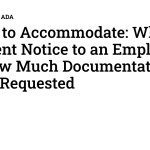ADA Damages for Failure to Accommodate: Understanding Your Rights

As you navigate the world of employment, education, and public spaces, it’s essential to know your rights under the Americans with Disabilities Act (ADA). One crucial aspect of the ADA is the requirement for reasonable accommodations to ensure equal access and opportunities for individuals with disabilities. But what happens when an employer, educational institution, or public entity fails to provide these accommodations? In this article, we’ll explore the concept of ADA damages for failure to accommodate, including what constitutes a failure to accommodate, how to file a complaint, and the potential damages you may be eligible for.
What Constitutes a Failure to Accommodate?
The ADA requires covered entities to provide reasonable accommodations to individuals with disabilities, unless doing so would cause an undue hardship or fundamentally alter the nature of the program, service, or activity. A failure to accommodate occurs when an entity refuses to provide a requested accommodation or fails to engage in the interactive process of identifying and implementing a reasonable accommodation.
Some examples of failures to accommodate include:
- Refusing to provide a sign language interpreter for a job interview or meeting
- Failing to modify a policy or procedure to accommodate an employee’s disability
- Denying a request for a service animal in a public place or workplace
- Ignoring an employee’s request for a flexible work schedule to accommodate a medical condition
ADA Damages for Failure to Accommodate: The Risks of Non-Compliance
When an entity fails to accommodate an individual with a disability, it may be liable for ADA damages for failure to accommodate. These damages can include:
- Compensatory damages for emotional distress, pain and suffering, and other non-economic losses
- Punitive damages to deter future non-compliance
- Reinstatement or promotion to a lost job or opportunity
- Back pay or front pay to compensate for lost wages or benefits
- Attorney’s fees and costs associated with filing and litigating a complaint
Filing a Complaint: The First Step towards ADA Damages for Failure to Accommodate
If you believe you’ve experienced a failure to accommodate, the first step is to file a complaint with the U.S. Equal Employment Opportunity Commission (EEOC) or the U.S. Department of Education (DOE). Here’s a general overview of the complaint process:
- Contact the EEOC or DOE: Reach out to the EEOC or DOE to inquire about the complaint process and determine which agency has jurisdiction over your claim.
- Gather documentation: Collect records and evidence to support your claim, including:
- Records of your disability and requests for accommodations
- Correspondence with the entity, including emails, letters, and meeting notes
- Witness statements or testimony
- Expert opinions or testimony
- File a complaint: Submit your complaint in writing, including your name, address, phone number, and a detailed description of the alleged failure to accommodate.
- Investigation and conciliation: The EEOC or DOE will investigate your complaint and attempt to resolve the issue through conciliation.
The Role of the EEOC in ADA Damages for Failure to Accommodate**
The EEOC plays a crucial role in investigating and resolving ADA complaints, including claims for ADA damages for failure to accommodate. The EEOC’s responsibilities include:
- Investigating complaints and gathering evidence
- Conducting interviews and mediations
- Issuing determinations and recommendations
- Enforcing ADA regulations and guidelines
Calculating ADA Damages for Failure to Accommodate**
Calculating ADA damages for failure to accommodate can be complex and depends on various factors, including:
- The severity of the failure to accommodate
- The impact on the individual’s life and well-being
- The entity’s intent and knowledge of the ADA requirements
- The availability of alternative accommodations or modifications
Damages may be awarded for:
- Past and future lost wages or benefits
- Emotional distress, pain and suffering, and other non-economic losses
- Attorney’s fees and costs associated with filing and litigating a complaint
Real-Life Examples of ADA Damages for Failure to Accommodate**
- EEOC v. Walmart: In 2019, Walmart agreed to pay $150,000 to settle a lawsuit alleging failure to provide reasonable accommodations for an employee with a disability.
- DOE v. University of California: In 2018, the University of California agreed to pay $100,000 to settle a lawsuit alleging failure to provide reasonable accommodations for a student with a disability.
Conclusion: Know Your Rights
In conclusion, ADA damages for failure to accommodate are a critical aspect of ensuring equal access and opportunities for individuals with disabilities. If you believe you’ve experienced a failure to accommodate, it’s essential to understand your rights and take action. By filing a complaint and seeking damages, you can hold entities accountable for non-compliance and advocate for a more inclusive and accessible society.
ADA Damages for Failure to Accommodate: Final Thoughts
- Remember, the ADA requires covered entities to provide reasonable accommodations to individuals with disabilities.
- Failing to accommodate can result in significant damages and liability.
- Know your rights and take action if you experience a failure to accommodate.
- ADA damages for failure to accommodate are a critical tool for promoting compliance and equal access.
<